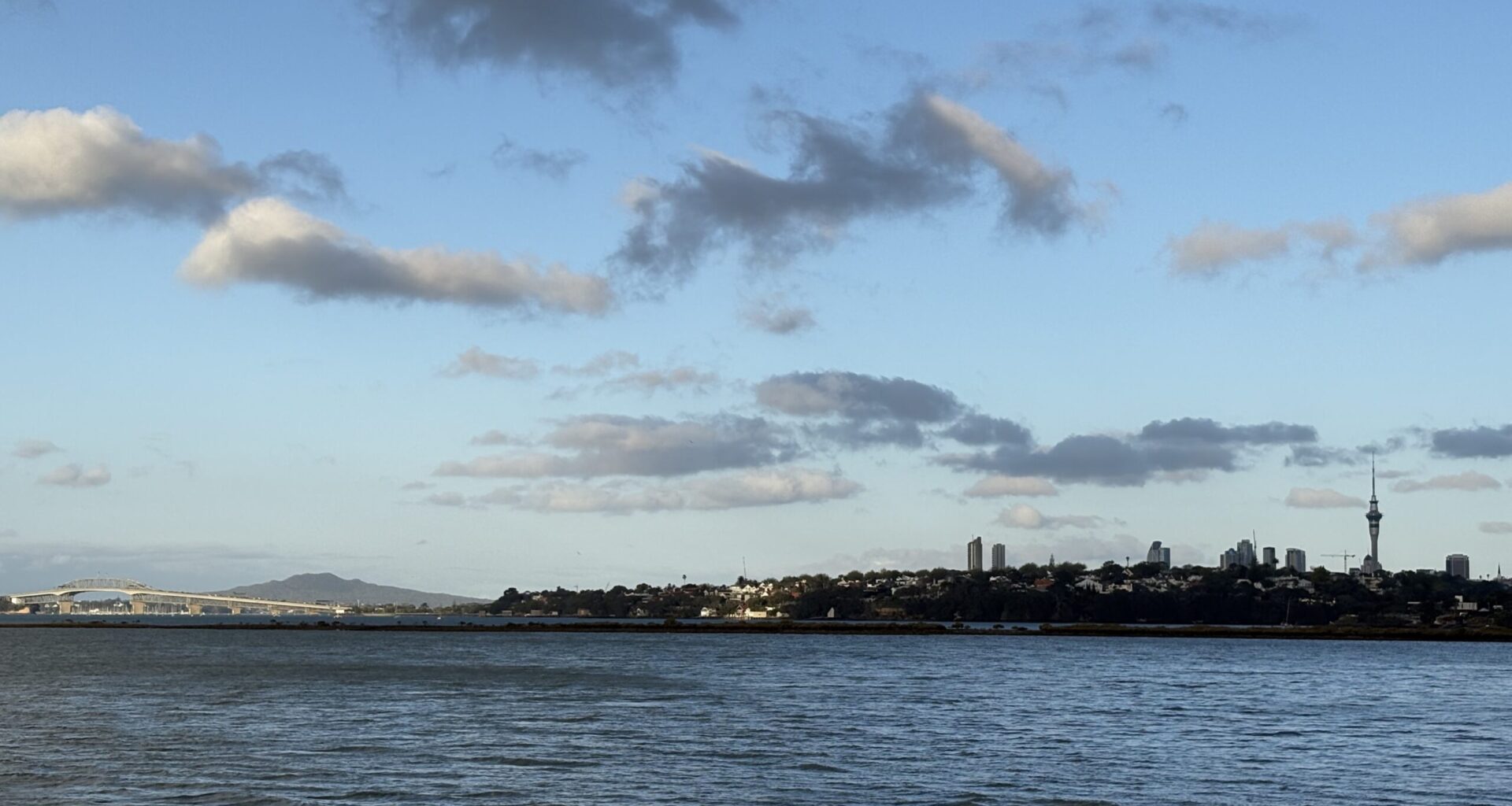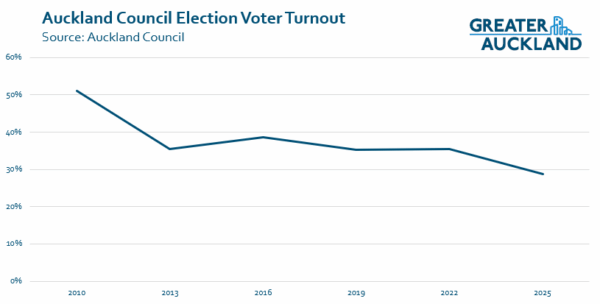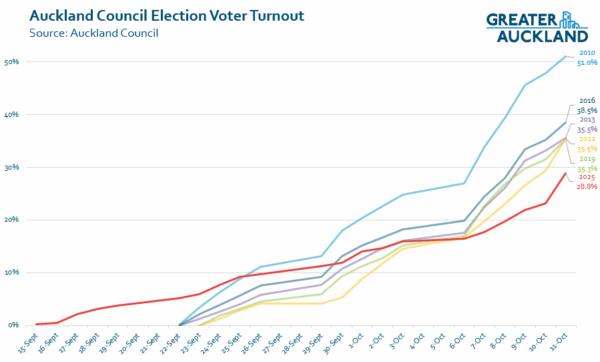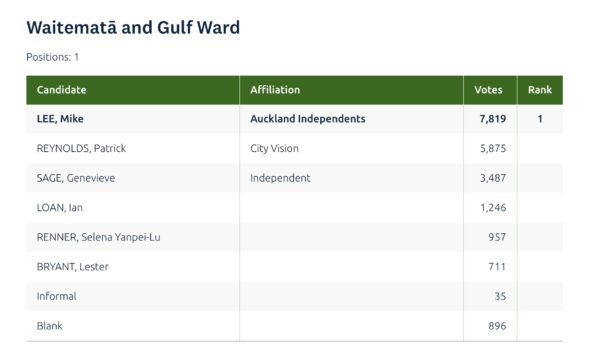We now have our first glimpse of the shape of the new council following the local body election on Saturday. The results emerge in three stages: “progress results” landed on Saturday afternoon, and “preliminary results” on Monday afternoon, with special votes (and thus the final outcomes) to come on Friday.
We aim to dig into the results in more detail, but a few initial takes for now…
Completely unsurprisingly, Wayne Brown easily regained the mayoralty, with over 50% of the vote. Interestingly, this is actually the first election since Auckland was amalgamated in which a candidate has received over 50% of the vote. The previous highest result was Len Brown in 2010, with just over 49%.
This election set another record too, and not a good one. The general downward trend in voter turnout continued to a new low, with fewer than 29% of eligible voters actually voting as of Monday’s results. With special votes are still to be counted, that number may go up a little. At the last election, there were around 7,000 special votes in Auckland – so a similar number again would bring turnout up to just over 29%. That’s still low compared to previous years, as this chart shows.
Moreover, voting numbers were down despite the voting period being extended this year. The red line on the chart below shows 2025, with an extra week of voting time compared to previous elections. Note too that 2010, the first Supercity election, had the highest turnout at 51%.
Why the low turn-out? No doubt there will be lots of post-mortems. Was it a case of people putting their voting forms in the “I’ll deal with that later” pile, and then forgetting? Or was it (more likely) related to this seeming to be a particularly boring election? With Wayne Brown seemingly a shoo-in, there was no high-profile ‘horse-race’ at the top. That said, several ward races were of key interest, as noted by Hayden Donnell for the Spinoff.
With a few good exceptions, it was also notable how little media attention this election had – in particular from the nominal paper of record, the NZ Herald. We understand that the Herald’s council-beat reporter, Bernard Orsman, was even on leave during the election period.
Whatever you think of the election outcome, that the question of who will (and who should) govern the country’s biggest and most important city isn’t considered important enough to cover in depth feels like a massive indictment of both the state of the media, and public attitudes towards our democracy.
By contrast, Wellington’s elections drew a lot more media attention, thanks to the Ray Chung scandal, and the ongoing attempts to foment opposition to things like cycleways. Paradoxically, this seems to have resulted in both the highest turnout since 2016 – and also in more people being elected who support things like cycleways. It’s also plausible that the STV approach to vote-counting is a stronger motivator, and something to be considered here.
Back to Tāmaki Makaurau: around our council table there will be five new faces, thanks to retirements and one sitting councillor losing their seat. As the Herald reported yesterday, from the Mayor’s perspective:
Brown said that apart from Victoria Short, who stood on his Fix Auckland ticket, and John Gillon (North Shore), he barely knew the three other new faces, Matt Winiata (Manurewa-Papakura), Bo Burns (Howick), and Sarah Paterson-Hamlin (Whau).
He plans to meet each one of them over the coming days and thinks the new council is a “little bit better” than last term.
By this, he meant he was pleased to see Short unseat one of the long-standing “Albanians”, Wayne Walker, and welcomed the defeat of two-time mayoral candidate and “keyboard warrior” Craig Lord, who lost to Paterson-Hamlin in Whau. As for Gillon, he said he plans to work with him, despite finding him “a bit negative”.
We don’t yet know how these new councillors will perform; but at first glance, the Mayor is probably right that he’ll have a little bit of an easier time getting policy delivered.
Of the new councillors, Sarah Paterson-Hamlin becomes the fifth person to represent Whau, with the seat changing hands almost every election
Coming back to the issue of media coverage, one sitting councillor who did get a lot of air-time in the last few months was Christine Fletcher, largely for her comments about housing policy. While she was re-elected, it was arguably the worst result of her six elections. As with Wellington, perhaps the lesson is that being constantly negative isn’t as appealing to voters.
Alf Filipaina also joins Fletcher in being elected six times, and they are the only two councillors who have been around the table continuously since amalgamation in 2010. Other long-serving councillors include John Watson and Mike Lee, who have each been elected five times (Lee returned in 2022 after losing his seat, promising one more term), and four who are now starting their fourth terms: Daniel Newman, Desley Simpson, Greg Sayers and Richard Hills.
In the coming weeks and months, we’ll learn what roles Wayne Brown gives each of these councillors, such as which committees they’re on – but at least one is already confirmed
There’s also what Brown called a coronation later this month, when councillors get sworn in at the Auckland Town Hall, and the “bollocks of setting up committees”, giving little away on that front other than “Richard Hills will still run planning because he does such a good job”.
A note from Patrick Reynolds
In my run for Councillor of Waitematā & Gulf, sadly I was not able to get ahead of veteran campaigner Mike Lee, and Friday’s special votes are unlikely to change this.
Preliminary results for the Council seat of Waitematā & Gulf ward as of Monday 13 October (special votes yet to come)
However, otherwise it was a great night for City Vision and its progressive kaupapa. City Vision runs council candidates in two wards – Waitematā & Gulf and Albert-Eden-Puketāpapa, where Julie Fairey was returned as Councillor, and now with more votes than the other returned incumbent, Christine Fletcher, whose usually massive majority was significantly lowered. CV also runs candidates in three local boards under those two wards. Of the three, City Vision looks set to control two: dominating the Waitematā Local Board 5-2, and a 5-3 majority in Albert-Eden. Whereas Puketāpapa Local Board currently has two City Vision candidates to four C&R; but if one more makes it through, which is possible, that’ll be a huge improvement on the last time across the board.
Local elections are of course not formal referenda on single issues; it is much more complex than that, especially with low engagement and media disinterest. However, there are still some interesting conclusions that can be drawn.
As with Wellington, where election issues received a great deal of coverage, no matter how vigorously the media platformed angry opponents of changes like safe streets and cycleways, the result was that proponents of progress did better in the election.
Wellington now has an even bigger Labour/Green majority around the council table. And up here, both City Vision local board teams have significantly improved their positions, a positive outcome for a large swathe of the isthmus (with further progressive wins in adjacent areas like Whau.)
In other words, despite a barrage of headlines over recent years, and relentless attempts at derailment (including by the re-elected councillor for Waitematā & Gulf), it seems that multi-modal street upgrades like Pt Chev, Meola Road, Great North Road, the Inner West links, Project K, and Victoria St, not to mention the so-called ‘destruction’ of the city centre via CRL works and Quay St, Queen St, Te Ha Noa, and Te Komititanga… are not all that “controversial” after all… and in fact may be popular?
The Waitematā & Gulf councillor vote is also pretty stark on another defining issue: you have to get all the way down to the fourth-placed candidate to find the first one who ran on a “low rates/ low services” platform. Clearly, as a policy plank, this is completely unpopular in Waitematā & Gulf, getting only about 10% of the votes at best (if you combine Loan and Bryant’s share).
It’s reassuring to know that voters value local services and understand they have to be funded somehow.
In terms of my result, I am of course extremely disappointed personally and for the city. I want to thank my fantastic team and supporters – we gave it our best shot. I will continue to work for the city I love and have so much faith in, in other roles.
– Patrick
Editorial post-script
Further to Patrick’s point about the popularity of supposedly “controversial” projects – it’s striking that, compared to 2022, City Vision not only held onto the Ōwairaka division of Albert-Eden, they extended their lead compared to last time.
This voting area is of course home to the Pt Chev/ Meola Road project, which was the subject of a significant number of headline-grabbing stories (as well as a successful Media Council complaint):
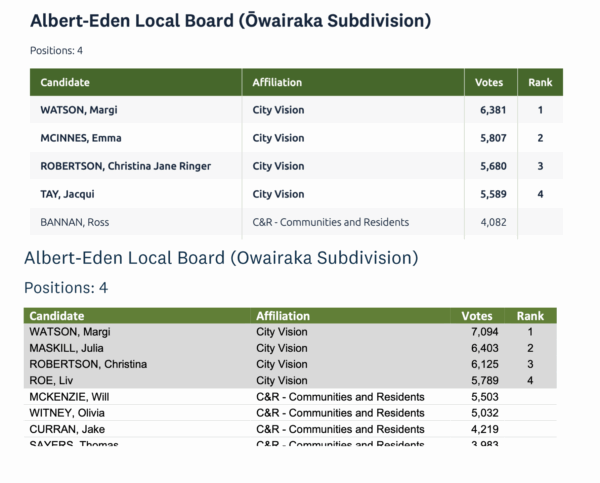 Albert-Eden Local Board (Ōwairaka division): preliminary 2025 results (top) and 2022 final results (bottom) show that City Vision not only retained seats, but widened the gap.
Albert-Eden Local Board (Ōwairaka division): preliminary 2025 results (top) and 2022 final results (bottom) show that City Vision not only retained seats, but widened the gap.
And, in the Maungawhau division of the same Local Board area, where the headlines have been more about housing, City Vision looks to have gained a seat (pending special votes) as well as closing the gap:
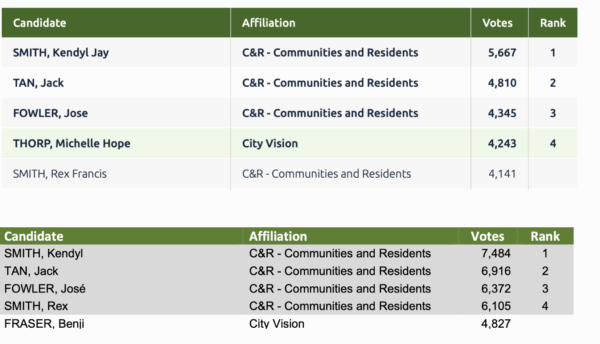 Albert-Eden Local Board (Maungawhau division): preliminary 2025 results (top) and 2022 final results (bottom) show City Vision potentially gaining a seat while also closing the gap.
Albert-Eden Local Board (Maungawhau division): preliminary 2025 results (top) and 2022 final results (bottom) show City Vision potentially gaining a seat while also closing the gap.
Similarly, take a look at the results for Waitematā Local Board, in whose rohe sit a number of other headline-grabbing projects like K Rd, Queen St, Quay St, Victoria St (Te Ha Noa), Project K, Great North Rd, Westmere streets, and half of Meola Rd, and the almost-complete CRL works. Here, City Vision secured a clear majority of seats, with the two incumbent C&R candidates that were returned dropping way down the list. An especially impressive performance by three new City Vision candidates Wilson, Elliott, and Kennedy:
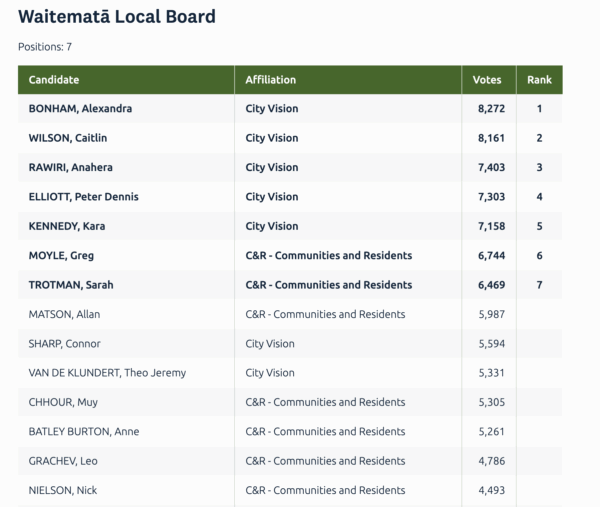 Preliminary results for Waitematā Local Board 2025, showing City Vision gaining five seats at the top of the slate, with two C&R candidates next.
Preliminary results for Waitematā Local Board 2025, showing City Vision gaining five seats at the top of the slate, with two C&R candidates next.
Connor, whose advocacy was so instrumental in securing a better outcome for Project K, did well but alas did not quite make the cut.
And below are the preliminary numbers for Puketāpapa Local Board, to round out Patrick’s report above. If the special votes were to lift one more City Vision candidate above the line, this board would be equally split. When this situation has occurred before on even-numbered boards (e.g. Albert-Eden), the two “parties” have agreed to take turns holding the chair across the term… leading to interesting outcomes when the chair exercises their casting vote.
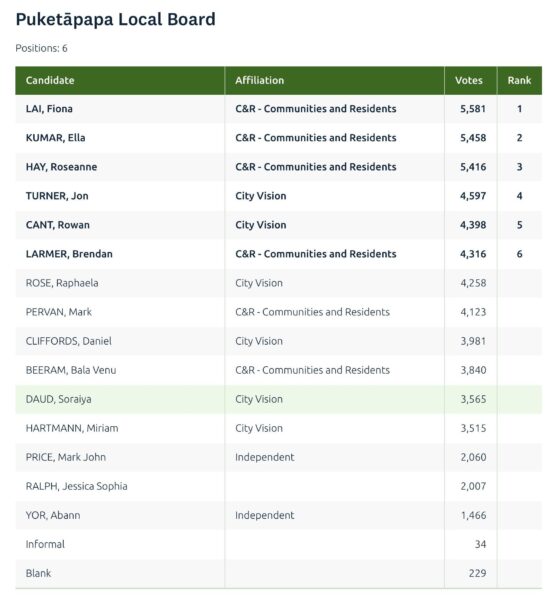 Preliminary results for Puketāpapa Local Board 2025, showing City Vision with two seats (same as last time), but with special votes yet to come.
Preliminary results for Puketāpapa Local Board 2025, showing City Vision with two seats (same as last time), but with special votes yet to come.
Regardless of the results, kudos and our thanks to everyone who ran and raised the quality of conversations about what our city is, and what it can be.
In future posts, we’ll take a closer look at other outcomes, and reflect more on what this all means for the next few years. In the meantime, we’re very keen to hear your thoughts on what you see in the results from across the city. Lots to discuss!
This post, like all our work, is brought to you by the Greater Auckland crew and made possible by generous donations from our readers and fans. If you’d like to support our work, you can join our circle of supporters here, or support us on Substack.
Share this

